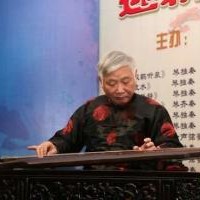Liu Zhengchun
Organized by 左树 on 2022-02-09

Liu Zhengchun (March 10, 1935 - June 1, 2013) is a representative of the modern Jinling School. In 2009, he was named the intangible cultural heritage - the national successor of the Jinling School of Guqin.
When Mr. Liu Zhengchun was fifteen years old, he studied the qin under the tutelage of Zhou Kongming of the Fanchuan School, and later learned from the qin masters of the Zhucheng School, Wang Shengxiang, Xia Yifeng of the Jinling School, Liu Shaochun of the Guangling School, Cheng Wujia of the Mei'an School, and Zhao Yunqing of the Jinling School. The style of the piano is based on the Jinling School, and does not take the advantages of other families, forming an artistic style of elegant, vigorous and simple, and rhyme and sound.
On November 7, 2003, the art of guqin was selected into the second batch of "Masterpieces of the Oral and Intangible Heritage of Humanity" by UNESCO. He is listed as one of the fifty-two inheritors who have been confirmed in the "Guqin Art Declaration", a reference model for the declaration of representative works of human oral and intangible heritage provided by the Chinese Academy of Arts.
In 2009, Mr. Liu Zhengchun was rated as the representative inheritor of national intangible cultural heritage (Guqin and Jinling Qin School).
Mr. Liu Zhengchun insisted on teaching the guqin voluntarily all his life, cultivated more than 1,000 piano students at home and abroad, and made positive contributions to the dissemination and promotion of the art of guqin.
His main works include "Exploring the Origin of Qin Music", "Fifty Years of Jinling Qin Forum", "Wang Shengxiang's Guqin Artistic Career", "Qin Trivia", "Er Qin Wu Qin Score" and other works on Qin studies.
Similar artist
Ni Shiyun, a native of Haimen District, Nantong City, Jiangsu Province, China's famous contemporary qin mojo, the fourth generation inheritor of the Mei 'an Qin School, the representative inheritor of the intangible cultural heritage of Jiangsu Province "Guqin art" (Mei 'an Qin school), serves as the director of the Chinese Kunqu Opera Guqin Research Institute and the executive director of the Chinese Qin Association.
read >>
Yang Qiong, the word Yu Rong, Yushan Qin school successor, South Yuqin Club president, operation aman for more than ten years, good at qin songs. He is currently the vice president of Shenzhen Guqin Association, member of Shenzhen Ethnic Orchestral Association, lecturer of Shenzhen University School of Continuing Education and so on.
read >>
Yang Zhijian, Guqin maker and performer. Born in Shanghai in July 1974. National first-class performer; representative inheritor of Shanghai intangible cultural heritage "Guqin-making skills"; vice-chairman of Shanghai Intangible Cultural Heritage Protection Association. Winner of "Shanghai Craftsman" and "May 1st Labor Medal" in 2017.
read >>
Huang Deyuan, inheritor of the intangible cultural heritage "Zhejiang style guqin" and "Wenzhou dialect recitation".
read >>
Involving musical instruments
Guqin (pinyin: Gǔ Qín) is a traditional Chinese musical instrument with a history of at least 3,500 years. Guqin is also known as Yaoqin, Yuqin and Seven-stringed Qin. The guqin has 13 emblems that mark the rhythm, and is also a ritual and musical instrument. It belongs to the silk in the octave. Guqin has a wide range, deep timbre and long aftertone.
Involved portfolio
象牙山首富 - 29 views
卷鹅 - 28 views
未知领地 - 34 views
日记里的汤姆 - 27 views
九曲 - 46 views
Involved news
Organized by 小何 on 2024-04-03
In the ancient times, Fuxi, the cultural ancestor of the Chinese nation, with his outstanding wisdom and profound insight into the universe, created a far-reaching artistic initiative -- piano making. This legend is like a bright pearl inlaid in the long history of Chinese civilization, and is still praised by later generations.
read >>
Organized by 未知领地 on 2024-03-17
When selecting a guqin, the timbre quality is often the primary criterion to judge its quality, because the timbre is not only related to the artistic expression of the guqin, but also deeply rooted in the unique pursuit of music aesthetics in traditional Chinese culture. Here are some basic timbre elements to consider when choosing a guqin.
read >>
Organized by Fucui on 2024-03-16
Guqin, as an ancient string instrument in China, has sophisticated fingering and contains profound aesthetic and philosophical ideas. In the process of learning Guqin, in addition to mastering correct fingering skills, avoiding mistakes is equally important. The following are five taboos that should be paid special attention to in Guqin fingerings.
read >>
Organized by 卷鹅 on 2024-03-14
With the arrival of the hot summer, for the guqin friends, how to do a good job in the hot and humid season of guqin maintenance is particularly important. Guqin as a traditional Chinese wooden chord instrument, its material is very sensitive to changes in temperature and humidity, so the correct maintenance of guqin in summer can not only extend the life of the instrument, but also maintain its pure timbre.
read >>
Organized by 南丘 on 2024-03-14
Among Chinese classical instruments, Guqin is highly respected by the world because of its profound cultural heritage and unique sound charm. The right-handed sound picking in its playing technique shows the characteristics of Guqin music, which is flexible and changeable and has profound charm. The right hand techniques of Guqin are rich and varied, including breaking, supporting, picking, hook, picking, beating, picking and other techniques, each technique contains high artistic and profound musical expression.
read >>
 渝公网安备 50010702504639号
渝公网安备 50010702504639号